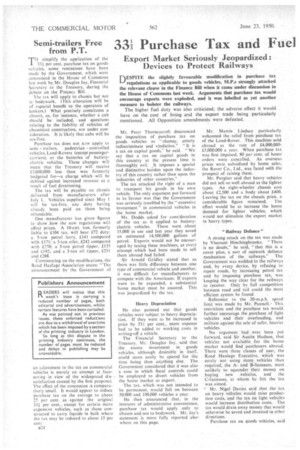33 . Purchase Tax and Fuel
Page 30

If you've noticed an error in this article please click here to report it so we can fix it.
Export Market Seriously Jeopardized : Devices to Protect Railways
DESPITE the slightly favourable modification in purchase tax regulations as applicable to goods vehicles, M.P.s strongly attacked the relevant clause in the Finance Bill when it came under discussion in the House of Commons last week. Arguments that purchase tax would encourage exports were exploded, and it was labelled as yet another measure to bolster the railways.
The higher fuel duty was also criticized; the adverse effect it would have on the cost of living and the export trade being particularly mentioned. All Opposition amendments were defeated.
Mr. Peter Thorneycroft denounced the imposition of purchase tax on goods vehicles as "clumsy, utterly indiscriminate and vindictive." "it is a tax on capital goods," he said. "We say that a tax on capital goods in this country at the present time is thoroughly evil. It imposes a special and distinctive burden upon the industry of this country rather than upon the industries of other countries."
The tax attacked the right of a man to transport his goods in his own vehicle. The only argument put forward in its favour was that the Government was seriously troubled by the " excessive investment" in commercial vehicles in the home market.
Mr. Dodds asked for consideration of the tax as it applied to battery electric vehicles. There were about 15,000 in use and last year they saved an estimated 14,500,000 gallons of petrol. Exports would not be encouraged by taxing these machines, as every attempt which had been made to sell them abroad had failed.
Sir Arnold Gridley stated that as there was little difference between one type of commercial vehicle and another, it was difficult for manufacturers to compete with the Americans. If exports were to be expanded, a substantial home market must be assured. This was jeopardized by the tax.
Heavy Depreciation
He also pointed out that goods vehicles were subject to heavy depreciation. If they were to be increased in price by 33/ per cent., more expense had to be added to working costs in writing-off a vehicle.
The Financial Secretary to the Treasury, Mr. Douglas Jay. said that the excess investment in goods vehicles, although desirable in itself, could more easily be spared for the time being than anything else. The Government considered that it was also a case in which fiscal controls could be employed to divert vehicles from the home market to export.
The tax, which was not intended to be permanent, would fall on between 50.000 and 100,000 vehicles a year.
He then announced that, in the interests of administrative convenience, purchase lax would apply only to chassis and not to bodywork. Mr. Jay's statement is more fully reported elsewhere on this page.
• Mr. Martin Lindsay particularly welcomed the relief from purchase tax of the Land-Rover. This machine sold abroad as the rate of £4,000,000£5,000,000 a year. When purchase tax was first imposed, 80 per cent, of hotne orders were cancelled. As overseas prices were subsidized by home sales, the Rover Co.. Ltd., was faced with the prospect of raising them.
Mr. Pargiter said that heavy vehicles did not sell so well abroad as the lighter types. An eight-wheeler chassis cost about £2,500 and a body about £400. Leaving the tax on the chassis price, a considerable figure remained. The effect would be to increase the home demand for lighter vehicles, which would not stimulate the export market in heavy types.
"Railway Defence" A strong attack on the tax was made by Viscount Hinchingbrooke. " There is no doubt," he said, that this is a cover plan, a sort of outwork defence mechanism of the railways." The Government was wedded to the railways and, by every device, by refusing to repair roads, by increasing petrol tax and by imposing purchase tax, was keeping the way clear for the railways to recover. Only by full competition between road and rail could the most efficient system be found.
Reference to the 20-m.p.h. speed limit was made by Mr. Pannell.This restriction and the purchase tax would further encourage the purchase of light vehicles and their overloading, and militate against the sale of safer, heavier vehicles.
No argument had ever been put forward, said Sir Austin Hudson, that vehicles not available for the home market would find purchasers abroad. There were three classes of user, the Road Haulage Executive, which was surely not using more vehicles than required, the Aand B-licensees, most unlikely to squander their money on buying new vehicles, and the C-licensees, at whom he felt the 'tax was aimed.
– Mr. Nigel Davies said that the tax on heavy vehicles would raise production costs, and the tax on light vehicles would increase distribution costs. The tax would drain away money that would otherwise be saved and invested in other directions. Purchase tax on goods vehicles, said












































































